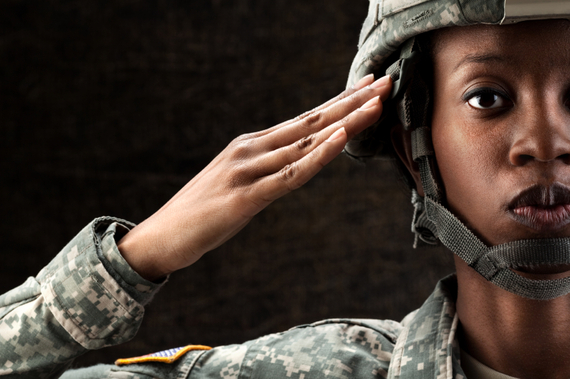Calling all women veterans -- who have been or are currently now homeless.
While the U.S. Department of Veterans Affairs has made great strides in reducing the number of homeless male veterans in cities across America, the numbers of homeless female veterans are actually on the rise.
As I've written before here, part of the problem why we don't "see" women veterans who are homeless is because we're not looking in the right direction. They're not exactly like what America loosely pictures as a homeless veteran, so sadly most of us aren't aware that there are homeless women veterans. That picture needs to change.
I'm a freelance journalist and a graduate student in public policy (social work). I have been paying attention to this issue, and I am determined to make things better for women veterans. This year, I was awarded a grant from the International Women's Media Foundation to create a multimedia project about homeless women veterans. The project includes includes presenting data from a national survey I conducted last year among women veterans about periods of homelessness they may have experienced after military service. (Read more about my grant in this article from Military Times.)
Here's where you come in.
If you are a woman who served in the U.S. military and you have struggled with a period of homelessness at any point after completion of your military service, I would like to hear from you. In particular, I would like you to consider taking on a creative assignment.
Using a cellphone camera, shoot a short (one or two minutes long) video of something important to you about the story of your experience with homelessness. You can "take us on a tour" of where you lived when you were (don't endanger yourself doing this, please), or where you are now, and how that feels.
You can talk to the camera about something significant to you (and your family, if that applies) about your experience -- either during homelessness, or afterwards.
America has no idea, generally speaking, what you are going through or what you went through. Help tell America what it's been like for you -- and what the rest of us could do for women veterans that might make a difference.
A few thoughts before you begin:
•Be sure you're ready to share your story with America, or just choose an aspect you would be ready to share.
•Be ready to prove your veteran status; a copy of your DD-214 will be necessary if your story is accepted.
•Consider whether you'd want to use your name and location, or whether you'd prefer to remain anonymous. You have the option not to reveal your identity to the public.
•And think a bit about what you'd like to say before you say it. What does America need to see or hear about your situation, and other women veterans like you? It's OK to do a few takes.
(There's a brief sample video on YouTube, where Oprah had a female veteran film a short clip about her own homelessness. You don't have to make yours like hers in any way, but it might be helpful to watch hers as a starting point for ideas.)
Interested?
Here are some tips:
•Shoot the video with your phone held horizontally -- it creates better video.
•Put your phone on airplane mode before you start, so a call coming in won't interrupt your video when you start to shoot.
•Don't shoot against a bright light (such as light coming from a window behind the subject you are shooting), or the video won't come out well.
•Stabilize the cell phone/camera against something sturdy for a better, firmer shot, or even with your elbows pressed in tight against your chest. You can also lean a selfie stick, if you have one, against a wall and talk to the phone that way.
•Don't include other people in the video, or shoot on private property or government property, where getting permission could be an issue. Just focus on you and telling your own story, or the part of it that you think would be significant to share.
If you're ready to participate, send me an email with your name, contact information, and a brief description of who you are (example: Army vet, served in Gulf War, was homeless for a few months after service) at hwvets@gmail.com that you're interested, and I'll provide further instructions about where to upload the video.
You can also help this project by sharing this article on social media or with your network, especially if it includes women veterans.
To be clear: No payment is offered or implied. I'm not technically getting paid for this either -- I'm getting specific expenses covered, but no salary or other compensation, so that I can bring this topic to America's attention. It's a labor of love for me, and I bet some of you might feel that way too. Cooperatively and collaboratively, we might just be making history: I mean, "herstory."
Here's what you might want to address in your video.
Choose any of these topics, or something you prefer.
Some ideas:
•How did you become homeless?
•What was the hardest part?
•What would you like others to know about female veteran homelessness?
•What do you think needs to change to help women veterans avoid homelessness?
•If you are no longer homeless, describe your journey to acquire permanent housing. How did you get there? What helped along the way?
Thank you!

